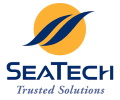

Vessel design and engineering specialist SeaTech Solutions International (“SeaTech”) as project lead of “Goal Zero” consortium has revealed the design of an electrically-powered lighter craft which is set to ply the waters of Singapore within the next three years. The fully electric lighter craft will be able to carry up to 12 passengers and 35 tonnes of cargo. It will be supported by a proposed charging infrastructure and equipped with battery packs which could be swapped for charging while the vessel carries out its operations uninterrupted. (Refer to Annex A for vessel design and preliminary specifications.)
Last month, the Maritime and Port Authority of Singapore (MPA) and the Singapore Maritime Institute (SMI) awarded funding to three consortiums – led by SeaTech, Keppel O&M and Sembcorp Marine for the study, testbed and deployment of their solutions across different types of harbour craft and operating profiles in Singapore port waters, through the electrification of a pilot use case proposed by each consortium. Singapore has 1,600 licensed diesel-powered harbour craft. The pilot project proposals will demonstrate how the electrification of specific use cases can be achieved on a sustainable and commercially viable basis while supporting Singapore’s wide-ranging initiatives to decarbonise the maritime sector.
Ms Quah Ley Hoon, Chief Executive, MPA, said, “Electrification has the potential to accelerate the decarbonisation of our local harbour craft industry so we are pleased to support the joint industry-research consortium named Goal Zero led by Seatech Solutions Pte Ltd and its key commercial partner Yinson Green Technologies in their electric vessel project. This is one of the three consortiums comprising 30 enterprises and research institutions across the value chain that we are supporting under the Maritime GreenFuture Fund. Mr. Prabjot Singh Chopra, Vice President, Technology of SeaTech shared, “The vision of the ‘Goal Zero’ consortium is to spur Singapore’s transformation into a zero-emissions port, hence our chosen consortium name. Our pilot project to design and build a fully electric lighter craft will also include a digital twin, electrification concepts, charging infrastructure, interoperability and digitalisation for adoption and deployment. This will enable an industry-wide contribution towards reducing carbon emissions as part of Singapore’s green port transformation.”

Lighter Craft
Battery Charging Infrastructure
Key considerations for the consortium’s proposed battery charging infrastructure will include the potential to design alternative charging facilities for reducing reliance on fixed shore-based facilities. This will enable the lighter craft to maintain their operational flexibility and reduce the need for ineffective movement through congested port waters. The evaluation of variable power ratings on a single charging station, featuring swappable batteries, floating energy supply with fast charging and a universal charging connection adaptor will provide innovative outcomes to enable charging of all types of electric vessels while improving commercial efficiencies.
“Goal Zero”
Mr. Chopra shared, “The members in this consortium are convinced that our harbourcraft electrification project has the potential to significantly contribute towards the goal of a carbon neutral footprint for Singapore. Through our collaborative efforts, we aim to do our part in helping our industry meet IMO’s greenhouse gas emission targets for 2030 and 2050 and enable the local harbour craft industry to meet Singapore’s 2030 enhanced Nationally Determined Contributions (NDC) target. “We are very excited to testbed our prototype design that will revolutionise the operations of our harbourcraft sector and forever change the seascape of Singapore port waters,” he concluded. “Goal Zero” consortium brings together the diverse expertise of 13 enterprises and research institutes. Project Lead SeaTech takes on the roles of vessel designer and system integrator, while Yinson Green Technologies is responsible for overall programme management and commercialisation. Other consortium members include Sterling PBES Energy Solutions as battery technology partner, Rina Hong Kong Limited Singapore Branch as classification society, industry partners Batam Fast Ferry, Bernhard Schulte (Singapore) Holdings, DM Sea Logistics, Marina Offshore, Kenoil Marine Services, Lita Ocean Pte Ltd and Jurong Port and research institutes Singapore Institute of Technology and Technology Centre for Offshore and Marine Singapore.
Source: SeaTech